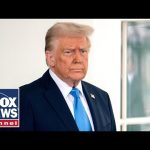In a controversial and closely watched decision, Robert F. Kennedy Jr. was confirmed as Secretary of Health and Human Services (HHS), marking a seismic shift in the leadership of one of the nation’s most influential agencies. With a narrow Senate vote of 52-48, Kennedy’s confirmation is being hailed by supporters as a victory for transparency and reform, while critics warn of potential disruption to public health initiatives. The move reflects President Donald Trump’s commitment to shaking up entrenched bureaucracies and empowering figures who challenge the status quo.
Kennedy, long known for his skepticism toward vaccines and sharp criticism of pharmaceutical companies, enters his role with a $2 trillion budget and oversight of key agencies like the FDA, CDC, and NIH. His appointment signals a dramatic departure from traditional public health leadership, with Kennedy pledging to prioritize chronic disease prevention, food safety, and what he calls “Make America Healthy Again” (MAHA). At the heart of his agenda is a promise to reduce industry influence over health policy—a stance that has drawn both praise from populist movements and alarm from established medical organizations.
The confirmation process was fraught with tension. Democrats uniformly opposed Kennedy, citing his history of promoting vaccine misinformation and conspiracy theories. Even some Republicans expressed reservations, with Senate Minority Leader Mitch McConnell voting against him due to concerns about undermining vaccine programs like those that eradicated polio. However, Kennedy’s supporters argue that his outsider perspective is precisely what HHS needs to address systemic issues in American healthcare, including skyrocketing drug prices and the prevalence of chronic illnesses.
Interestingly, the pharmaceutical industry has remained largely silent on Kennedy’s confirmation—a stark contrast to its usual lobbying efforts. Analysts suggest this may be a calculated move to avoid inflaming populist sentiment or drawing further scrutiny. By refraining from public opposition, industry leaders appear to be hedging their bets, hoping that Kennedy’s rhetoric will not translate into drastic policy changes. This cautious approach underscores the shifting political landscape under Trump’s leadership, where traditional power players are increasingly sidelined by grassroots movements demanding accountability.
As Kennedy assumes his new role, significant challenges lie ahead. The Department of Government Efficiency (DOGE), led by Elon Musk, is implementing sweeping workforce reductions across federal agencies, potentially limiting HHS’s capacity to execute its programs. Additionally, Kennedy’s lack of experience in managing large bureaucracies may complicate his ability to navigate the complexities of federal health policy. Nevertheless, his confirmation represents a bold experiment in governance—one that could redefine the relationship between government agencies and the industries they regulate.
For many Americans, Kennedy’s appointment embodies a broader push for reform and accountability in Washington. Whether he succeeds in delivering on his promises or faces insurmountable obstacles remains to be seen. What is clear, however, is that his tenure will be closely watched as a test case for how far populist-driven change can go in reshaping America’s institutions.




